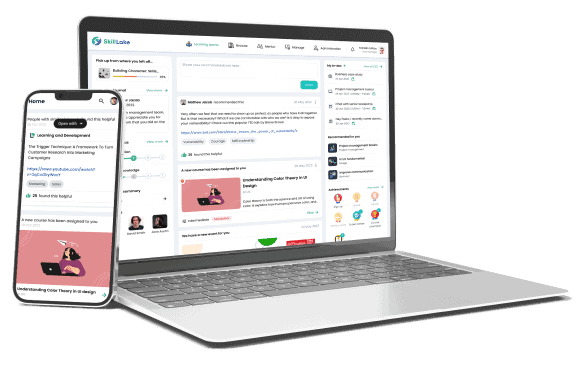Learning Management Systems for Non-Profits: Unlocking the Benefits

The pandemic compelled many non-profit organizations (NPOs) to respond quickly to the outbreak and the economic crisis that followed, forcing them to make hard decisions. These forces resulted in stressful revamping (e.g., layoffs, reduced programming, remote work, organizational restructuring). It is estimated that 37% of such organizations reduced their workforce due to the pandemic. However, one saving grace is that these changes frequently made organizations stronger and enhanced their agility in responding to their objective. Implementing Learning Management Systems for Non-Profits proved to be a valuable asset during these challenging times, enabling efficient remote training, upskilling, and fostering organizational resilience.
75% of nonprofit organizations stated that COVID-19 negatively impacted their funding and earnings. Since these non-profits have pivotal missions, increased organizational efficiency and creativity are critical. A variety of new challenges, including technological advances, merging of public, private, and social sector silos, rising donor expectations, and the need to demonstrate significant impact and ROI, make operating and guiding a non-profit and accomplishing mission objectives more complicated and challenging. This reality may persist even after the COVID-19 outbreak gets contained. The challenge now is whether non-profits can maintain and keep making the kinds of performance-enhancing improvements they were capable of achieving during the pandemic.
Common Learning Management Systems for Non-Profits challenges – a comprehensive look
It is vital for employees working in the non-profit sector to obtain relevantly and high-quality training and development. Employers and managers must give specialized training programs that inform and inspire their staff to feel focused and motivated toward their goals. Limited budgets, geographically distributed personnel, and part-time employment is contributors to the issues for non-profits, making it hard to get staff and volunteers together to learn.
Let’s go over the top training challenges for non-profits here to help develop a strategic plan for a viable solution: a learning management system for non-profits.
1. Training standardization
A major problem for training and development, particularly in corporate contexts, is being consistent and achieving similar L&D results from the same learning resources.
An effective LMS for nonprofits can effectively reduce this by equipping learners with standardized, relevant content.
2. Geographically dispersed learners
It is unusual to discover a non-profit organization with all of its personnel in one area. Employees of non-profit organizations often get dispersed over several offices, branches, hubs, and locations. Bringing staff together for a training session is only one of the many training issues that non-profits face.
Challenges associated with this can get eliminated with an effective learning management system for nonprofits. When a learning portal with an integrated training creation tool gets utilized effectively, one can easily create interesting online material that can be delivered everywhere, on any device, at any time, and with consistency.
3. Limited training budget
Workshops are not only cumbersome to organize, but they are also the least efficient way of delivering efficient training. A portion of the cost of a workshop gets spent on expenses that do not directly connect to training outcomes – including manual printing, training room rental, travel expenses, facilitator charges, wasteful travel time, and so on.
A learning management system for non-profits can come in handy here. If you choose a learning portal with no set-up fees and an active-user subscription system, you can significantly decrease your training costs and increase training efficiency.
4. Inadequate in-house IT and training personnel
Most non-profits do not have the funds for training teams – or even a dedicated training resource. In-house IT personnel can be scarce as well.
This poses numerous individual hurdles in non-profit training:
- Inability to offer large-scale in-person or workshop training.
- Difficulty in offering hosted online virtual or webinar training.
- Inadequate time to spend managing training (enrolments, reports) at a large scale.
- Inability to track progress (send reminders, track compliance).
- Difficulty deploying complicated learning management systems with high set-up costs.
- Difficulty in creating needed online training using advanced eLearning tools.
When a non-profit does not have committed human resources to devote towards training, production, and delivery, there is a need for an automated learning solution that can handle training at scale. It must also be a cloud-based platform with little or no IT deployment requirements.
5. Engaging learners
Another challenge in training and development is ensuring that your staff is completely involved with your learning platform and material. This is due to the trainee’s inability to comprehend the objectives or recognize the relevance of the training. The style of distribution could also become dull at times.
There are two approaches to this problem: The first step is to develop a dynamic nonprofit online training repertoire that employs a range of delivery techniques to achieve its learning objectives. As previously mentioned, employ approaches such as microlearning or other audio-visual aspects in your LMS.
6. Customized and compliance training
Employees and volunteers at non-profits require individualized training. It is an elite training obstacle for non-profits to face. Every non-profit organization has its own rules, procedures, methods, and criteria. First, it is imperative for non-profits to acquire training on compliance rules like bullying, WHS, and others. Second, you must be able to provide customized training for your organization’s “style of doing things.”
As a result, an LMS for a non-profit that is more than simply an administrative tool is necessary. It should also provide appropriate ready-made compliance training and have an easy-to-use method for capturing internal information and transforming it into appealing online learning.
7. Receiving feedback and program completion
The exit procedure of course delivery is last among other e-training problems that your talent development may confront. How do you guarantee your learning objectives come to fruition if you don’t have them?
Individual completion and accomplishment rates are simple to track using an LMS. Most eLearning platforms include monitoring and reporting features to assist you with this work.
Read more: How Enterprise LMS Makes A Difference To Non-Profit Organizations
How LMS can help provide effective Nonprofit online training
The COVID-19 outbreak will pass, but the disturbances mentioned will probably definitely endure. Many non-profit organizations will need to alter their programming and optimize their resources to meet their objectives and continue operations.
The best LMS for non-profits provides:
- Standardization of training
- Cost-efficient and hassle-free learning
- Training for team and community
- Manage content better
- Track your learners
- Get feedback from learners
LMSs can find utilization in increasing operational efficiency and allowing human resources to focus on meeting goals. Existing LMS tools and platforms can perform continuing analysis and give real-time insights that aid non-profits with program delivery, fundraising, and other activities. These technology tools can find use in strategically supplementing resources for one-time initiatives and scale resources when project demand and priority improvements alter. When non-profits function virtually, their efficiency in service delivery increases dramatically.
LMSs with cloud services and storage; and technology to improve performance have significant untapped potential to save resources and offer chances to meet objectives. It’s not that being proficient in technology was vital in this pandemic; it’s that the pandemic made it abundantly evident that it’s critical to be proactive about technology and plan. The pandemic brought this point home.
How Skill Lake can be the solution you’re looking for!
Skill Lake delivers successful people development for non-profits through responsible, engaging, and individualized learning. With powerful learner dashboards, content creation tools, a knowledge repository, and mobility, you can generate a growth trajectory in your employees’ training and learning graph. Experience a complete eLearning culture that goes beyond functional skills with Skill Lake while working together to achieve organizational goals!
With Skill Lake, non-profits can:
- Avoid expenses like teacher salaries, travel, and more with classes available 24×7.
- Enable synchronous, asynchronous, self-paced, instructor-led, and microlearning to provide flexibility in providing learning content.
- Develop courses pertinent to non-profits such as diversity and inclusion, communication, and social skills effortlessly.
- Improve learner engagement and information retention using gamified, video-based, and visually attractive courses.
- Structure courses that meet the demands of the personnel, their learning ability, and their comfort level.
- Allow non-technical workers to study at their speed by promoting individualized learning and micro-learning.
- Provide instructor-led training, and ensure efficient tracking and supervision in technology-intensive classes.
- Ensure consistent learning, and content delivery, monitor employee participation and customize training programs based on your staff’s needs.

Get a quick demo on Skill LMS by connecting with our team.
Build a culture of continuous learning with Skill Lake’s state-of-the-art people development platform. Give your employees professional training to help them excel in their job roles and propel your business to greater efficiency and success.
Start Today

Ashmitha Chatterjee
Ashmitha is a learning and development enthusiast who shares her insights on e-learning. She loves to create engaging and informative content and is dedicated to helping people learn and grow through her deep expertise in the field.